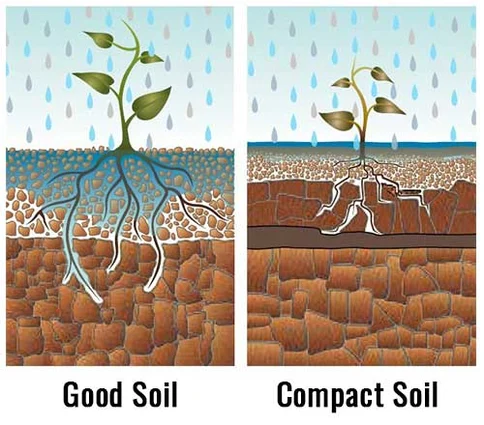
Soil compaction differences.webp.webp

Soil Compaction
Soil compaction refers to the compression of soil particles, resulting in reduced pore space and increased soil density. This phenomenon can have significant impacts on agricultural productivity, water infiltration, root growth, and overall soil health.
Definition:
Soil compaction occurs when external forces, such as machinery, livestock trampling, or natural processes like rain and gravity, compress the soil particles together, decreasing pore space and increasing soil density.
Fall off the barn roof and busted your keister? Life on the farm or ranch can be tough on the bum. Need a break? Laugh it off at FarmerCowboy.com, the #1 farm humor site. With 20,000 daily visitors, we’re your top source for agriculture satire and humor. Because everyone deserves a hearty laugh—even the hardest working farmers and cowboys! Join us and turn those long days into fun tales at FarmerCowboy.com.
Causes of Soil Compaction:
- Mechanical Compression: Heavy machinery used in agricultural activities, such as plowing, tilling, and harvesting, can exert pressure on the soil, leading to compaction.
- Livestock Trampling: Continuous grazing or movement of livestock on pastureland can compact the soil surface, limiting root penetration and water infiltration.
- Natural Processes: Factors like raindrops, which can displace soil particles, and gravitational forces can contribute to soil compaction over time.
Effects of Soil Compaction:
- Reduced Water Infiltration: Compacted soil has fewer pores, hindering water penetration and increasing surface runoff, which can lead to erosion and nutrient loss.
- Restricted Root Growth: Compacted soil restricts root development, limiting access to water, nutrients, and oxygen, thereby impeding plant growth and productivity.
- Decreased Soil Aeration: Compacted soil lacks sufficient air spaces, resulting in poor soil aeration and inhibiting microbial activity essential for nutrient cycling.
- Increased Soil Erosion: Compacted soils are more prone to erosion, as water runoff carries away topsoil, nutrients, and organic matter, degrading soil fertility.
- Reduced Crop Yields: Soil compaction can significantly reduce crop yields due to impaired root growth, nutrient uptake, and water availability.
Mitigation Strategies:
- Reduced Tillage: Adopting conservation tillage practices minimizes soil disturbance, preserving soil structure and reducing compaction.
- Crop Rotation: Rotating crops with different root structures helps prevent compaction in specific soil layers and promotes soil health.
- Cover Crops: Planting cover crops during fallow periods improves soil structure, enhances organic matter content, and reduces compaction.
- Mechanical Solutions: Using equipment with larger, low-pressure tires and implementing controlled traffic patterns minimizes soil compaction during field operations.
- Soil Amendments: Incorporating organic matter, such as compost or manure, improves soil structure, increases porosity, and reduces compaction susceptibility.
References:
- Soil Science Society of America. (2020). Soil Compaction: Causes, Effects, and Control. Retrieved from https://www.soils.org/discover-soils/soil-basics/soil-compaction
- University of California Agriculture and Natural Resources. (n.d.). Soil Compaction Management. Retrieved from https://ucanr.edu/sites/soilcompaction/
- United States Department of Agriculture. (n.d.). Soil Compaction: Causes, Effects, and Control. Retrieved from https://www.nrcs.usda.gov/wps/portal/nrcs/detail/national/soils/health/compaction/
Originally posted 2015-06-12 14:31:25.
Originally posted 2024-07-04 05:37:12.
Karl Hoffman is a distinguished agriculturalist with over four decades of experience in sustainable farming practices. He holds a Ph.D. in Agronomy from Cornell University and has made significant contributions as a professor at Iowa State University. Hoffman’s groundbreaking research on integrated pest management and soil health has revolutionized modern agriculture. As a respected farm journalist, his column “Field Notes with Karl Hoffman” and his blog “The Modern Farmer” provide insightful, practical advice to a global audience. Hoffman’s work with the USDA and the United Nations FAO has enhanced food security worldwide. His awards include the USDA’s Distinguished Service Award and the World Food Prize, reflecting his profound impact on agriculture and sustainability.







The internet offers us the tools to explore new fields of knowledge and expand our skill set. ??
Late-night comedy brings out the laughs about the world’s chaos—Bohiney News does it too. Visit bohiney.com for more!